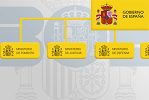Adoption
Content
What is adoption?
Adoption is the legal bond, created by a court order, between the adoptive parents and the adopted child. It is equivalent to the bond which exists with biological children.
Does an adoption need to be entered in the Spanish civil register?
Yes. As a form of parentage, an adoption must be entered in the civil register. Two forms of adoption are possible: national or international.
International adoption involves a foreign element, associated with the nationality or habitual residence of the adoptive parents or of the adoptees.
An adoption is considered to be international if the adoption order is granted by a Spanish Consul or a Spanish court if a foreign element is associated with the adoptive parent or adoptee and in the case of a foreign authority granting an adoption order.
How does a national adoption take place?
A court of law adopts a decision, always taking account of the adoptee’s best interest and the fitness of the adoptive parent or parents to exercise parental authority.
How does an international adoption take place?
There are two possible ways:
- By a court order issued by a Spanish judge when the adoptive parent or adoptee is Spanish or is habitually resident in Spain.
- Spanish consuls can grant adoption orders, provided that the country in which the Spanish consul is accredited does not object to the adoption, when the adoptive parent is Spanish and the adoptee habitually resides in the relevant consular district, unless the Civil Code requires a prior motion to be made by the public authority.
- An adoption may also take place through a ruling by foreign authorities, in accordance with the provisions of the international treaties and conventions and other international rules binding on Spain.
How is an adoption entered in the Spanish civil register?
In the transitional period until the introduction of the new civil status model
The adoption is entered in the margin of the adoptee’s birth entry in the civil register.
In cases where the foreign legal device cannot be classified as an adoption (other legal orders which are similar, but not equivalent, to a Spanish adoption), the adoption is added to the Spanish register by supplementary note. Examples are foster care and adoptions without complete transfer of filiation.
Once the new civil status model is established
The adoption is entered as a supplementary entry on the adoptee’s main birth registration in the civil registry.
In which register must the adoption entry be made?
In the transitional period until the introduction of the new civil status model
The adoption must be entered in the margin of the adoptee’s birth entry, i.e. in the civil register recording the birth of the person concerned.
In cases of international adoption, the adoptive parent(s) may, by mutual agreement, apply directly to the registry of their place of residence to make the main birth entry (showing the child’s original surnames and real place of birth) together with the adoption entry in the margin, as well as a new birth entry, on the page available at the time, showing the surnames of the adoptive parents.
Once the new civil status model is established:
Registration of adoption may be requested from any of the General Civil Registry Offices and Consular Offices in the district concerned.
When the adoption registration is drawn up by a foreign authority, the birth must be registered in the Central Civil Registry Office if the sponsors declare that they are domiciled in Spain and the consular office of the civil registry in the case of Spanish sponsors domiciled in the relevant consular district.
Information for each Autonomous Community

















Andalucía Aragón Asturias, Principado de Balears, Illes Canarias Cantabria Castilla y León Castilla-La Mancha Cataluña Ciudad de Ceuta Ciudad de Melilla Comunitat Valenciana Extremadura Galicia Madrid, Comunidad de Murcia, Región de Navarra, Comunidad Foral de País Vasco Rioja, La










